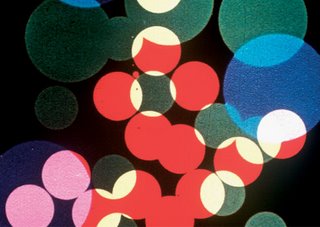tisdag, augusti 29, 2006
The Situationists paradoxically combined a revolutionary—even a utopian—concern,to create an entirely new Paris of the future, with a strong conservationist streak, endlessly condemning the destruction of old streets and protesting the bureaucratic ‘modernization’ of the city. For instance, the destruction of the Rue Sauvage in the 13th Arrondissement was specifically mourned in Potlatch. Later, the destruction of the old market area around Les Halles, to create a shopping centre and an art museum, was fiercely attacked by Debord. When I co-organized the Situationist exhibition at the Beaubourg, Debord indicated that he would not be able to attend because he had sworn never to set foot in the building. First, it bore the hated name of Pompidou, the accursed foe of 68, and, second, it was the poisoned fruit of the destruction of the previous huddle of street and café life, beloved by Debord and his comrades.Peter Wallen, Situationists and Architecture, i New Left Review 8, 2001.
A number of areas of Paris, on the other hand, were singled out for positive attention. Arrondissement 7 was favourably invoked—the district around and behind Les Invalides. The Square des Missions Étrangères, near the junction of Rue de Babylone and Boulevard Raspail, was specifically recommended. 36 Rue des Morillons was praised. This could be the abbatoir, according to my map. It would be easy to carry out a Situationist tour of Paris, because Debord’s two folding maps of the city specifically pick out the areas worth wandering in and indicate with bright red arrows possible directions for taxi journeys between them. Areas of the city suggested for special attention and research were the Butte-aux-Cailles, near the Place d’Italie; the ‘Continent of Contrescarpe’, presumably the area round the Place de la Contrescarpe; the Morgue; Aubervilliers, just outside the city limits to the north; and the Désert de Retz. In this sense, we can see that the apparent call made by the Situationists for ‘total’ revolution needs to be somewhat nuanced. While social relations should be totally transformed, the best of the past should be honoured and preserved. In fact, in many of Debord’s texts, there is a strongly elegiac note and an intense involvement with the past, not only its struggles and failed revolutions, but also its literature and its monuments.
Är inte detta en mycket mer sympatisk Debord - en utforskare av det gömda och bortglömda, en revolutionär melankoliker - än den tröttsamme skådespelskritiker han så ofta reduceras till? Jag ser gärna ett visst mått av elegisk konservatism i min situationism.
måndag, augusti 28, 2006
On her left breastJag har just läst ut Cymbeline. Den var min reselektyr när jag var på arbetsresa till Danmark förra vecka, läste den på tåget, och på färjan Göteborg-Fredrikshamn, bland blinkande spelautomater, räksmörgåsar, parfymdoftande taxfreevaror. Vare sig man väljer att se pjäsen - en av hans senare - som ett försök av Shakespeare att ge sig ut på okänd mark eller en parodisk rekapitulering av allt han tidigare skrivit är den onekligen märklig. Men sorgesången över den skendöda Imogen får mig att rysa varje gång jag läser den:
A mole cinque-spotted, like the crimson drops
I' the bottom of a cowslip
Fear no more the heat o' the sun,[Hugh Kenner i The Pound Era:
Nor the furious winter's rages;
Thou thy worldly task hast done,
Home art gone, and ta'en thy wages;
Golden lads and girls all must,
As chimney-sweepers, come to dust.
Fear no more the frown o' the great;
Thou art past the tyrant's stroke:
Care no more to clothe and eat;
To thee the reed is as the oak:
The sceptre, learning, physic, must
All follow this, and come to dust.
Fear no more the lightning-flash,
Nor the all-dreaded thunder-stone;
Fear not slander, censure rash;
Thou hast finished joy and moan;
All lovers young, all lovers must
Consign to thee, and come to dust.
No exorciser harm thee!
Nor no witchcraft charm thee!
Ghost unlaid forbear thee!
Nothing ill come near thee!
Quiet consummation have;
And renownéd be thy grave!
"Golden lads": fine words to caress our post-Symbolist sensibilities. English lads, perhaps, with yellow hair; "golden," because once precious when they lived; "golden," touched with the nobility and permanence of gold (that royal metal, colored like a cold sun, in which wages are paid), as now, gone home, they receive the wages of immortality; "golden," in contrast to "dust": a contrast of color, a contrast of substantiality, a contrast of two immemorial symbols, at once Christian and pagan: the dust to which all sons of Adam return, the gold by which human vitality braves time; dust, moreover, the environment of chimney-sweepers, against whose lot is set the prominence of shining youth, la jeunesse dorée, who may expect to make more of life than a chimney-sweeper does, but whom death at last claims equally. "Golden," magical word, irradiates the stanza so that we barely think to ask how Shakespeare may have found it.s 121-122]
Yet a good guess at how he found it is feasible, for in the mid-20th century a visitor to Shakespeare's Warwickshire meat a countryman blowing the grey head off a dandelion: "We call these golden boys chimney-sweepers when they go to seed."
And all is clear? They are shaped like a chimney-sweeper's broom. They come to dust when the wind disintegrates them. And as "golden lads," nodding their golden heads in the meadows around Stratford, the homely dandelions that wilt in the heat of the sun and would have no chance against the furious winter's rages, but seed never confront winter because they turn to chimney-sweepers and come to dust, would have offered Shakespeare exactly what he needed to establish Fidele's death in Cymbeline as an easy, assimilable instance of nature's custom.
Death as the blowing of a common flower: that is how he seems to have understood what he was writing. Then very early in the play's career, perhaps on the afternoon of the first performance if there were no Warwickshire ears in the Globe to hear that Warwickshire idiom, the dandelions and their structure of meaning simply dropped out. Yet for 350 years no one has reported a chasm. Even in the great age of conjectural emendations no editor emends "golden" to some more assimilable word. Also no one remarks upon its beauty. Hanmer or Theobald may have thought it "incorrect" byt authentic, scribbled without pause for a second thought, in one of the thousand lines Ben Jonson wished his great colleague had bloted. One sign of Augustan dissatisfaction is detectable: in 1749 William Collins felt moved to rewrite the entire song, omitting among many other words the word "golden."
But we, the heirs of Mallarmé and Valéry and Eliot, do not simply pass over "golden" but find it richly Shakespearean, its very indefiniteness interacting as though chemically with the other words in the poem.
[Hagberg, förresten: Räds ej mer för solens glöd, / Ej för bistra vintersnön! / Du har lemnat jordens nöd, / Nått ditt hem och fått din lön: / Sven och mö med lockars gull / Måste bli till kolsvart mull.]
Idag kände jag den första höstvinden.

Ustad Bismillah Khans död fick mig att plocka fram en sällan spelad cd ur hyllan igår: SENTIMENTAL SHEHNAI, inhandlad i en liten indisk skivaffär i Köpenhamn för sex år sedan, en sommar då jag bodde i Malmö och läste korrektur på Sydsvenska Dagbladet. Jag var upptagen med mina vanliga söndagsbestyr i lägenheten - barntillsyn, småstädning, plock med disk och tvätt - men musiken trängde genom vardagssysslorna med full kraft (hur ofta lyssnar vi egentligen på musik? hur ofta ger vi den vår fulla, odelade uppmärksamhet?); Elliott - 5 månader imorgon - sov rofyllt till en början, men efter ett tag fick Bismillah Khans "sentimentala shehnai" sällskap av exalterat babyjoller. John Coltranes sopransaxofon på My Favorite Things väckte en liknande reaktion för ett tag sedan. (Elliotts musikaliska prägling pågår för fullt, men hittills tycks han föredra Judas Priests "Breaking the Law" framför Monteverdis "L'Orfeo".)
(Jag vet väldigt lite om indisk klassisk musik, men hos Panchamkauns vet man desto mer.)
onsdag, augusti 09, 2006
Japansk tv-reklam från 1967 - med en bild på Albert Ayler som flimrar förbi under en kvartssekund eller så.
Underbart: BiblioOdyssey om The visual context of music. (Nog finns det kompositörer vars noter är mer stimulerande än den framföra musiken: Satie är väl det klassiska exemplet.)
Fifteen years of the web: BBC firar med internetnostalgi. Och här lite Usenet-arkeologi: Tim Berners-Lee tillkännager "The WorldWideWeb Project", augusti 1991.
tisdag, augusti 08, 2006
Sedan sajten lanserades i december ifjol har Muppet Wiki växt till att innehålla över 100 000 artiklar. Herregud. (Mina förebilder och favoriter: Statler & Waldorf.) (Gamla Zappa-fans, se hit.)
måndag, augusti 07, 2006
En av de skivor jag spelat mest de senaste veckorna, fram och tillbaka till jobbet, är Matmos The Rose Has Teeth in the Mouth of a Beast. Jag hade inte förväntat mig att tycka så mycket om den: tidigare har jag mest förknippat Matmos med deras samarbeten med den rysligt överskattade "Björk" och var skeptisk, men samarbetet med People Like Us öppnade mina öron. Och The Rose Has Teeth är rik, mäktig audio-poesi: Matmos själva ger ingående beskrivningar spår-för-spår här, och visst kan det verka konceptuellt i överkant, men dels är det inget fel i att uppskatta ett fyndigt koncept, dels behöver man inte känna till att låtarna samplar en förtorkade livmoder från en ko eller smyginspelat sex från en gayklubb för att uppskatta slutresultatet. Hyllningen till Ludvig II är sanslös: pompa och ståt, med Maja Ratkjes vansinnessopran som grädde på det kungliga moset.
Ett lite försenat grattis på ettårsdagen till Sakernas tillstånd!





